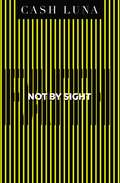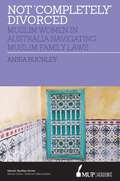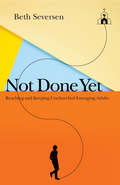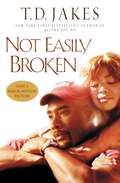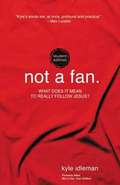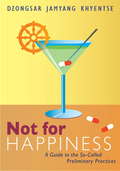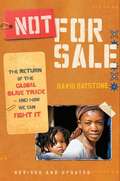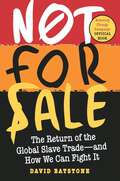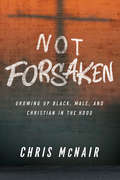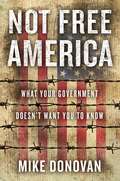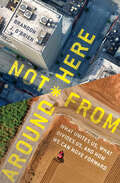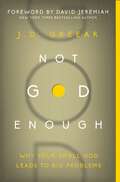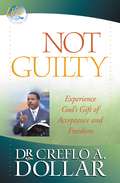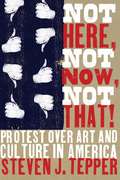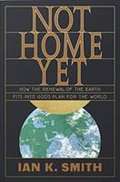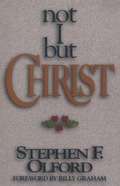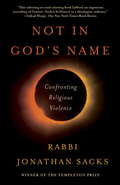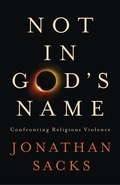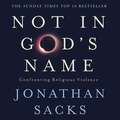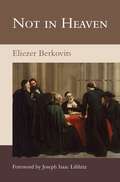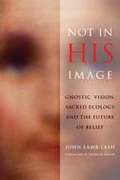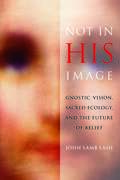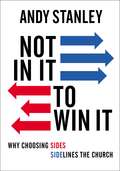- Table View
- List View
Not By Sight: Only Faith Opens Your Eyes
by Cash LunaTo walk by faith, one needs courage and humility because you need to shut your eyes to the pessimism of this world and be led by the promises of blessing your Heavenly Father has for you. Living by Faith, contrary to what many believe, is actually designed for superior minds with the ability to speak and act according to what really is true –the Word of God. Dare to always challenge your faith for it’s the most powerful and effective tool you have for daily living and extraordinary miracles of healing and provision in your daily life. Just believe and declare for supernatural results in your life!Press forward in faith and not by sight. Our senses can easily deceive us, but God’s care for us is eternal. I can bear witness to this time and time again first-hand. It’s not about vehemently declaring that we are believers, but about reflecting it every step of the way, even in the simplest and most mundane things. Because our faith in God is designed to sustain us in everything. It’s not a matter of religion but of everyday living. It’s about opening our eyes each morning and entrusting all that we are to God -all that we say, think, do, dream and desire. If we choose to activate our faith and work hard the right way, He’ll take care of the results in every area of our life, be they spiritual, emotional, physical, relational or financial.Living by faith in God is both simple and challenging at the same time. I always sum it up in this phrase: “Give yourself to the Lord.” This covers a number of things from knowing His Word where we find our identity and code of conduct, to our attitude in every situation in life, be it large or small.Whenever they ask me how is it possible to raise a ministry such as Casa de Dios, I can say without a shadow of a doubt that it’s only been by believing God wholeheartedly, following His instructions and honoring Him for His faithfulness! 35 years of walking in faith has given me the assurance that God is never looking for perfect people but for humble hearts willing to believe Him at His Word. And if He could do with me what some deem impossible, then He can surely do it with you too, because I’m no more than a simple man who chose to walk the path that God selected. If you have a dream in your life, or goals to reach and projects to fulfill, then LIVE BY FAITH! If your one of those people that feel blessed and get up every morning wanting more, or perhaps you’re going through a difficult trial right now, no matter your situation, I can assure you that you’ll soon be sharing about a new season of miracles in your life! Live by faith!
Not 'Completely' Divorced: Muslim Women in Australia Navigating Muslim Family Laws
by Anisa BuckleyWithin Muslim communities in Australia, there is great diversity in Islamic practice and religiosity. When it comes to marriage and divorce, however, many Muslims still wish to observe religious procedures alongside civil ones, and while marriage is relatively straightforward, divorce raises more complications. The situation of women in 'limping' marriages in particular has raised debates among Muslims and the Australian public regarding the autonomy of Muslim women and the function of community family law processes. Based upon in-depth research with divorced Muslim women, community leaders and local religious authorities, Buckley reveals the complexities facing Muslim women in negotiating family expectations, cultural norms and traditional Islamic laws. Through their stories and experiences, the Muslim women in this book demonstrate how they are able to navigate the intricacies of religious and civil processes and in so doing, are reformulating what a 'complete' divorce looks like. Islamic Studies Series - Volume 29
Not Done Yet: Reaching and Keeping Unchurched Emerging Adults
by Beth SeversenNones claim no religion. Dones have become disillusioned and left the church. Research shows many young adults are landing in one of these camps. But that's not the end of the story. Many emerging adults, ages eighteen to thirty-three, are tossing aside the none and done labels and are instead embracing a transformative Christian faith. Based on her extensive research, scholar-practitioner Beth Seversen outlines a model for how to engage and retain millennials and Generation Z in the life of the local church. Emerging adults are likely to experience spiritual transformation in churches that welcome them into community, provide meaningful opportunities to make a difference, and invest in their development. Whether you're a senior pastor or a youth minister, a parent or an educator, Not Done Yet will open your eyes to the generational barriers to vibrant faith while equipping you with insights to make your outreach to emerging adults more authentic and impactful.
Not Easily Broken: A Novel
by T. D. JakesAfter years of disagreeing about what true happiness, success, and love really are, Dave and Clarice Johnson finally face the breaking point of their marriage. When Clarice's leg is crushed in a car wreck, the obvious truth that more than just her injuries need immediate attention is finally exposed. Clarice and Dave struggle to find restoration as they learn the importance of promises made and kept - and the truth that help sometimes comes from unlikely places.
Not A Fan: What Does It Mean To Really Follow Jesus?
by Kyle IdlemanIf someone asked, "Are you a fan of Jesus?", how would you answer? You attend every movie featuring a certain actor, you know the stats of your sports hero, and you can recite lyrics from your favorite songs. In short, you're a huge fan. But are you treating Jesus the same as the other people you admire? The truth is Jesus wants more than the church attendance, occasional prayer, and the ability to recite Scripture--the fan response. He's looking for people who are actually willing to sacrifice in order to follow him. In this student edition of Not a Fan, Kyle Idleman uses humor, personal stories, and biblical truth as he challenges you to look at what it means to call yourself a Christian and follow the radical call Jesus presents. So, will you be a fan, or a follower?
Not for Happiness: A Guide to the So-Called Preliminary Practices
by Dzongsar Jamyang KhyentseDo you practise meditation because you want to feel good? Or to help you relax and be "happy"? Then frankly, according to Dzongsar Jamyang Khyentse, you are far better off having a full-body massage than trying to practise the Dharma. Genuine spiritual practice, not least the Ngöndro preliminaries, will not bring the kind of comfort and ease most worldly people crave. Quite the opposite, in fact. But if your ultimate goal is enlightenment, Ngöndro practice is a must, and Not for Happiness your perfect guide, as it contains everything an aspiring practitioner needs to get started, including advice about: * developing "renunciation mind" * discipline, meditation and wisdom * using your imagination in visualization practice * why you need a guru
Not for Sale
by David BatstoneHuman trafficking generates $32 billion annually and enslaves over 30 million people, half of them children. Award-winning journalist David Batstone, whom Bono calls "a heroic character," profiles the new generation of abolitionists who are leading the movement. This groundbreaking global report is now updated with the latest findings, new stories, and statistics that highlight what is being done to end this appalling epidemic--and how you can join the movement.
Not for Sale: The Return of the Global Slave Trade—and How We Can Fight It
by David Batstone“Human trafficking is not an issue of the left or right, blue states or red states, but a great moral tragedy we can unite to stop . . . Not for Sale is a must-read to see how you can join the fight.” —Jim Wallis, author of God's Politics“David Batstone is a heroic character.” —BonoIn the revised and updated version of this harrowing yet deeply inspirational exposé, award-winning journalist David Batstone gives the most up-to-date information available on the $31 billion human trafficking epidemic. With profiles of twenty-first century abolitionists like Thailand’s Kru Nam and Peru’s Lucy Borja, Batstone tells readers what they can do to stop the modern slave trade. Like Kevin Bales’ Disposable People and Ending Slavery, or E. Benjamin Skinner’s A Crime So Monstrous, Batstone’s Not for Sale is an informative and necessary manifesto for universal freedom.
Not Forsaken: Growing Up Black, Male, and Christian in the Hood (Not Forsaken)
by Chris McNairNot Forsaken: Growing up Black, Male and Christian in the Hood encapsulates principles author Chris McNair gleaned from successfully working with at-risk African American boys in the inner city in over thirty years of ministry. This book teaches how youth workers can address social, emotional, physical and spiritual issues facing young black men in the city. It is about building a relational ministry among black youth, centered on instilling a sense of identity in Christ and provides a study curriculum to use with the young men themselves.In addition to in-depth content from the Leader Guide, the study sessions contains everything needed to begin to equip leaders and guide a group through the study including session plans, activities, and discussion questions.
Not Free America: What Your Government Doesn't Want You to Know
by Mike DonovanNot Free America is a call to all Americans to take back our constitutional freedoms and break free of &“our abusive relationship with our government.&” Mike Donovan&’s groundbreaking work on behalf of personal liberties has made him an object of fascination on both the Right and the Left.In this groundbreaking book, Mike Donovan, the CEO of Nexus Services, calls out the elites who wield power in our country—not only the elites at the federal level, but the elites who exert control over us in our states and counties, our cities and towns. Not Free America is a passionate call to all freedom-loving Americans to take back our constitutional freedoms and break free of what he calls &“our abusive relationship with our government.&” Donovan details how the &“wholesale shredding of the Bill of Rights&” started long before the concurrent crises of Covid-19 and the protests and violence that followed the murder of George Floyd. Not Free America shows us how those events were used by forces in our local, state, and federal governments that had systematically been abridging our rights for decades. These rights, Mike reminds us, are God-given rights guaranteed to us by the Constitution, the Bill of Rights and the Fourteenth Amendment. As the pastor of the First Christian Church Universalist in Harrisonburg, Virginia, Mike Donovan is far from your quiet country clergyman. A fierce warrior with the spirit of God and the tough skin of a lawyer, he has dedicated his life to protecting liberty and preserving individual rights, serving the underserved, and ministering to those who are overlooked in our broken society. Indeed, there are aspects to his past and present that make him an easy target for judgment from all directions. But Mike Donovan hides from nothing: He openly embraces the faults of his past and dedicates his present to creating a future that helps others move past their own unfortunate pasts. Born to a poor family in Page County, Virginia, he found himself at a young age convicted of writing bad checks, resulting in multiple felonies for which he served seven months in the county jail. But the time he served didn&’t break him; it helped make him the man he is today: a man of the law and a man of God who believes with all his heart and soul in the possibility of redemption and the power of moving beyond past mistakes. He also came out of that experience knowing he needed to make a difference for others who found themselves in the same place he&’d just been. Not content to talk the talk, Mike Donovan walks the walk in the footsteps of the Jesus who said &“I was in prison and you came to visit me . . . Whatever you do for the least of these, you do for me.&” Not Free America shows us how to do all that for America and for our children. The book ends with &“The Liberty Pledge&”: an agreement readers will make stating that they will vote only for lawmakers who agree to uphold the rights and freedoms guaranteed by the Bill of Rights and the Fourteenth Amendment.
Not From Around Here: What Unites Us, What Divides Us, and How We Can Move Forward
by Brandon J O'BrienTidy categories may suit the media, but people are more complex up close.News outlets, historians, and sociologists can (and do) tell us all about the statistics, but they don&’t (and can&’t) tell us about what it&’s really like in a given place—how the squish of creek water between your toes or the crunch of autumn leaves on a city sidewalk shape your sense of normal and good and right. To understand that—to understand the people in the places—we need stories. We need to listen, get to know the nuance of people, and have empathy for their way of seeing things. Brandon O&’Brien is, in many ways, a man torn between places. Raised in the rural South, educated in the suburbs, and now living and doing ministry in Manhattan, he&’s seen these places, and their complexity, up close. With the knack of a natural storyteller, he shares what he learned about himself, faith, and the people who make up America on his own journey through it.
Not From Around Here: What Unites Us, What Divides Us, and How We Can Move Forward
by Brandon J O'BrienTidy categories may suit the media, but people are more complex up close.News outlets, historians, and sociologists can (and do) tell us all about the statistics, but they don&’t (and can&’t) tell us about what it&’s really like in a given place—how the squish of creek water between your toes or the crunch of autumn leaves on a city sidewalk shape your sense of normal and good and right. To understand that—to understand the people in the places—we need stories. We need to listen, get to know the nuance of people, and have empathy for their way of seeing things. Brandon O&’Brien is, in many ways, a man torn between places. Raised in the rural South, educated in the suburbs, and now living and doing ministry in Manhattan, he&’s seen these places, and their complexity, up close. With the knack of a natural storyteller, he shares what he learned about himself, faith, and the people who make up America on his own journey through it.
Not God Enough: Why Your Small God Leads to Big Problems
by David Jeremiah J. D. GreearYour God is too small.We like God small. We prefer a God who is safe, domesticated, who thinks like we think, likes what we like, and whom we can manage, predict, and control. A small God is convenient. Practical. Manageable.The truth: God is big. Bigger than big. Bigger than all the words we use to say big.Ironically, many today seem turned off by the concept of an awesome, terrifyingly great God. We assume that a God you would need to fear is guilty of some kind of fault. For us, thinking of God as so infinitely greater and wiser than we are and who would cause us to tremble in his presence is a leftover relic from an oppressive, archaic view of religion.But what if this small version of God we’ve created is holding us back from the greatest experience of our lives—from genuine, confident, world-transforming faith?In Not God Enough, J.D. reveals how to discover a God who:is big enough to handle your questions, doubts, and fearsis not silentis worthy of worshipwants to take you from boring to bold in your faithhas a purpose and mission for you on earthis pursuing you right nowGod is not just a slightly better, slightly smarter version of you. God is infinite and glorious, and an encounter with Him won’t just change the way you think about your faith. It’ll change your entire life.
Not Guilty: Experience God's Gift of Acceptance and Freedom
by Creflo A. DollarFor more than eighteen years I have repeatedly studied the subject of righteousness, and I am still amazed by it. Each time I thought I fully understood righteousness I would uncover deeper layers of revelation knowledge, which forced me to admit I had much more to learn. It is much deeper than we think. Our righteousness in Christ is the centerpiece on which Christian faith is built. Everything God's Word promises us hangs on it, and the entire structure of our salvation is built upon it. If we are going to walk in the joy of our salvation and the power of the promises we have in Him, we must understand our righteousness in Christ. When Christians hear the word righteous, nearly all of us think we understand what it means. The biggest part of the problem is that very few understand. We only think we do. Often, our religious traditions have distorted our understanding of righteousness. Consequently, the authority that God intended for us to have has been rendered totally ineffective. This means some of our religious traditions have to die. That's okay. The truth is, many of us have been at the mercy of inaccurate scriptural translations injected with personal theologies. We've been victims of a "Well, that's the way we've always done it" kind of thinking. The watered - down traditions that have resulted have seduced many into a powerless, ineffective form of religious thinking instead of the vital, dynamic faith that really can move mountains. Think about it. If traditions and religious thinking have all the answers, then why are so many of us living broke, disgusted, and defeated lives? Why are our kids still plagued with drugs? Why are debts still overwhelming to so many of us? Why are so many people still dying of cancer?The raw truth, for so many people, is that nothing is working. Why? Because something is missing. A major part of the equation is simply not there; that is, a proper understanding of our righteousness in Christ. This book was written to help God's righteousness become real in your life. In fact, I want it to be so real that Satan loses his grip on you. I want you to experience the life and power God intends for you to have through the gift of righteousness. If you attain an unshakable confidence in the righteousness of God, then this book will have achieved its purpose and the righteousness of God will make a mark in your life that cannot be erased!
Not Here, Not Now, Not That!: Protest over Art and Culture in America
by Steven J. TepperIn the late 1990s Angels in America,Tony Kushner’s epic play about homosexuality and AIDS in the Reagan era, toured the country, inspiring protests in a handful of cities while others received it warmly. Why do people fight over some works of art but not others? Not Here, Not Now, Not That! examines a wide range of controversies over films, books, paintings, sculptures, clothing, music, and television in dozens of cities across the country to find out what turns personal offense into public protest. What Steven J. Tepper discovers is that these protests are always deeply rooted in local concerns. Furthermore, they are essential to the process of working out our differences in a civil society. To explore the local nature of public protests in detail, Tepper analyzes cases in seventy-one cities, including an in-depth look at Atlanta in the late 1990s, finding that debates there over memorials, public artworks, books, and parades served as a way for Atlantans to develop a vision of the future at a time of rapid growth and change. Eschewing simplistic narratives that reduce public protests to political maneuvering, Not Here, Not Now, Not That! at last provides the social context necessary to fully understand this fascinating phenomenon.
Not Home Yet: How the Renewal of the Earth Fits into God's Plan for the World
by Ian K. SmithBeginning with the creation of the heavens and earth and ending with the New Jerusalem, the storyline of Scripture reveals God’s commitment to the physical world that he created. Our final destiny is not some disembodied, heavenly existence but rather life with God on a renewed earth. How does this understanding of our future home affect our lives today? What role should Christians play in meeting physical needs? Are spiritual realities more significant than physical? This book will help us understand God's eternal vision for the renewal of this earth and discover purpose in all of our daily, real-world endeavors, such as work, the arts, social justice, ecology, medicine, and more.
Not I, But Christ
by Stephen F. OlfordAdapted from the book jacket: Stephen Olford clearly expounds the profound 'secret' to living the Christian life summarized in Galatians 2:20. This book is Warmly illustrated with personal anecdotes, stories from the lives of great Christians ancient and modern, and powerful biblical examples. The author has captured the classic evangelical doctrine of sanctification and expressed it for a new generation. The key to victorious living is not a philosophy to be learned, nor deeper doctrinal insight to be grasped; it is not some new spiritual discipline to be practiced, but the simple yet profound reality that the risen Lord Jesus Christ wishes to live out His life through ordinary believers, by the power of His Holy Spirit who resides within them. Note: The indexes did not scan well, and were deleted.
Not in God's Name
by Jonathan SacksIn this powerful and timely book, one of the most admired and authoritative religious leaders of our time tackles the phenomenon of religious extremism and violence committed in the name of God. If religion is perceived as being part of the problem, Rabbi Sacks argues, then it must also form part of the solution. When religion becomes a zero-sum conceit--that is, my religion is the only right path to God, therefore your religion is by definition wrong--and individuals are motivated by what Rabbi Sacks calls "altruistic evil," violence between peoples of different beliefs appears to be the only natural outcome. But through an exploration of the roots of violence and its relationship to religion, and employing groundbreaking biblical analysis and interpretation, Rabbi Sacks shows that religiously inspired violence has as its source misreadings of biblical texts at the heart of all three Abrahamic faiths. By looking anew at the book of Genesis, with its foundational stories of Judaism, Christianity, and Islam, Rabbi Sacks offers a radical rereading of many of the Bible's seminal stories of sibling rivalry: Cain and Abel, Isaac and Ishmael, Jacob and Esau, Joseph and his brothers, Rachel and Leah. "Abraham himself," writes Rabbi Sacks, "sought to be a blessing to others regardless of their faith. That idea, ignored for many of the intervening centuries, remains the simplest definition of Abrahamic faith. It is not our task to conquer or convert the world or enforce uniformity of belief. It is our task to be a blessing to the world. The use of religion for political ends is not righteousness but idolatry . . . To invoke God to justify violence against the innocent is not an act of sanctity but of sacrilege." Here is an eloquent call for people of goodwill from all faiths and none to stand together, confront the religious extremism that threatens to destroy us, and declare: Not in God's Name.From the Hardcover edition. of the Abrahamic monotheisms--passages that, when interpreted literally, can lead to hatred, violence, and war--is an eloquent, clarion call for people of goodwill from all faiths to join together to end the misunderstandings that threaten to destroy us all.
Not in God's Name: Confronting Religious Violence
by Jonathan Sacks***2015 National Jewish Book Award Winner***In this powerful and timely book, one of the most admired and authoritative religious leaders of our time tackles the phenomenon of religious extremism and violence committed in the name of God. If religion is perceived as being part of the problem, Rabbi Sacks argues, then it must also form part of the solution. When religion becomes a zero-sum conceit—that is, my religion is the only right path to God, therefore your religion is by definition wrong—and individuals are motivated by what Rabbi Sacks calls “altruistic evil,” violence between peoples of different beliefs appears to be the only natural outcome. But through an exploration of the roots of violence and its relationship to religion, and employing groundbreaking biblical analysis and interpretation, Rabbi Sacks shows that religiously inspired violence has as its source misreadings of biblical texts at the heart of all three Abrahamic faiths. By looking anew at the book of Genesis, with its foundational stories of Judaism, Christianity, and Islam, Rabbi Sacks offers a radical rereading of many of the Bible’s seminal stories of sibling rivalry: Cain and Abel, Isaac and Ishmael, Jacob and Esau, Joseph and his brothers, Rachel and Leah. “Abraham himself,” writes Rabbi Sacks, “sought to be a blessing to others regardless of their faith. That idea, ignored for many of the intervening centuries, remains the simplest definition of Abrahamic faith. It is not our task to conquer or convert the world or enforce uniformity of belief. It is our task to be a blessing to the world. The use of religion for political ends is not righteousness but idolatry . . . To invoke God to justify violence against the innocent is not an act of sanctity but of sacrilege.” Here is an eloquent call for people of goodwill from all faiths and none to stand together, confront the religious extremism that threatens to destroy us, and declare: Not in God’s Name.From the Hardcover edition.
Not in God's Name: Confronting Religious Violence
by Jonathan SacksDespite predictions of continuing secularisation, the twenty-first century has witnessed a surge of religious extremism and violence in the name of God.In this powerful and timely book, Jonathan Sacks explores the roots of violence and its relationship to religion, focusing on the historic tensions between the three Abrahamic faiths: Judaism, Christianity and Islam.Drawing on arguments from evolutionary psychology, game theory, history, philosophy, ethics and theology, Sacks shows how a tendency to violence can subvert even the most compassionate of religions. Through a close reading of key biblical texts at the heart of the Abrahamic faiths, Sacks then challenges those who claim that religion is intrinsically a cause of violence, and argues that theology must become part of the solution if it is not to remain at the heart of the problem.This book is a rebuke to all those who kill in the name of the God of life, wage war in the name of the God of peace, hate in the name of the God of love, and practise cruelty in the name of the God of compassion.For the sake of humanity and the free world, the time has come for people of all faiths and none to stand together and declare: Not In God's Name.
Not in God's Name: Confronting Religious Violence
by Jonathan SacksDespite predictions of continuing secularisation, the twenty-first century has witnessed a surge of religious extremism and violence in the name of God.In this powerful and timely book, Jonathan Sacks explores the roots of violence and its relationship to religion, focusing on the historic tensions between the three Abrahamic faiths: Judaism, Christianity and Islam.Drawing on arguments from evolutionary psychology, game theory, history, philosophy, ethics and theology, Sacks shows how a tendency to violence can subvert even the most compassionate of religions. Through a close reading of key biblical texts at the heart of the Abrahamic faiths, Sacks then challenges those who claim that religion is intrinsically a cause of violence, and argues that theology must become part of the solution if it is not to remain at the heart of the problem.This book is a rebuke to all those who kill in the name of the God of life, wage war in the name of the God of peace, hate in the name of the God of love, and practise cruelty in the name of the God of compassion.For the sake of humanity and the free world, the time has come for people of all faiths and none to stand together and declare: Not In God's Name.(P)2016 Hodder & Stoughton
Not in Heaven: The Nature and Function of Jewish Law
by Eliezer BerkovitsIn this classic work, Rabbi Eliezer Berkovits analyzes Jewish law as it applies to the religious, ethical, and judicial principles of Judaism in the ever-changing human situation. Delineating common sense, feasibility, and ethical concern as the underpinnings of the Jewish legal system, Berkovits provides a wealth of original insights into the very essence of halacha.
Not in his Image: Gnostic Vision, Sacred Ecology, and the Future of Belief
by John Lamb LashBasing much of Not in His Image on the Nag Hammadi and other Gnostic writings, John Lamb Lash explains how a little-known messianic sect propelled itself into a dominant world power, systematically wiping out the great Gnostic spiritual teachers, the Druid priests, and the shamanistic healers of Europe and North Africa. They burned libraries and destroyed temples in an attempt to silence the ancient truth-tellers and keep their own secrets. But as Lash reveals, when the truth is the planet Earth it cannot be hidden or destroyed. Not in His Image delves deeply into the shadows of ancient Gnostic writings to reconstruct the story early Christians tried to scrub from the pages of history, exploring the richness of the ancient European Pagan spirituality-the Pagan Mysteries, the Great Goddess, Gnosis, the myths of Sophia and Gaia-and chronicles the annihilation of this Pagan European culture at the hands of Christianity. Long before the birth of Christianity, monotheism was an anomaly; Europe and the Near East flourished under the divine guidance of Sophia, the ancient goddess of wisdom. The Earth was the embodiment of Sophia and thus sacred to the people who sought fulfillment in her presence. This ancient philosophy was threatening to the emerging salvation-based creed of Christianity that was based on patriarchal dominion over the Earth and lauded personal suffering as a path to the afterlife. As Derrick Jensen points out in the afterword, in Lash's hands Jesus Christ emerges as the agent provocateur of the ruling classes.
Not in His Image: Gnostic Vision, Sacred Ecology, and the Future of Belief
by John Lamb Lash Derrick JensenBasing much of Not in His Image on the Nag Hammadi and other Gnostic writings, John Lamb Lash explains how a little-known messianic sect propelled itself into a dominant world power, systematically wiping out the great Gnostic spiritual teachers, the Druid priests, and the shamanistic healers of Europe and North Africa. They burned libraries and destroyed temples in an attempt to silence the ancient truth-tellers and keep their own secrets. But as Lash reveals, when the truth is the planet Earth it cannot be hidden or destroyed. Not in His Image delves deeply into the shadows of ancient Gnostic writings to reconstruct the story early Christians tried to scrub from the pages of history, exploring the richness of the ancient European Pagan spirituality--the Pagan Mysteries, the Great Goddess, Gnosis, the myths of Sophia and Gaia--and chronicles the annihilation of this Pagan European culture at the hands of Christianity. Long before the birth of Christianity, monotheism was an anomaly; Europe and the Near East flourished under the divine guidance of Sophia, the ancient goddess of wisdom. The Earth was the embodiment of Sophia and thus sacred to the people who sought fulfillment in her presence. This ancient philosophy was threatening to the emerging salvation-based creed of Christianity that was based on patriarchal dominion over the Earth and lauded personal suffering as a path to the afterlife. As Derrick Jensen points out in the afterword, in Lash's hands Jesus Christ emerges as the agent provocateur of the ruling classes.
Not in It to Win It: Why Choosing Sides Sidelines The Church
by Andy StanleyIs it possible to disagree politically and love unconditionally? The reaction of evangelicals to political and cultural shifts in recent years revealed what they value most. Lurking beneath our Bible-laced rhetoric, faith claims, books, and sermons is a relentless drive to WIN!But the church is not here to win. By every human measure, our Savior lost. On purpose. With a purpose. And we are his body. We are not in it to win anything. We are in it for something else entirely. That something else is what this book is about.You'll discover:How to take a stand the right way. You'll learn how to make your case with a posture of humility and understanding, rather than being fueled by the fear of losing something.How to view politics through the lens of faith. Learn curiously, listen intentionally, and love unconditionally.How the life of Jesus and his teaching applies to modern-day challenges in a fresh way. The "biblical" stand may not be what we've been taught.Jesus never asked his followers to agree on everything. But he did call his followers to obey a new command: to love others in the same way he has loved us. Instead of asserting our rights or fighting for power, we need to begin asking ourselves: what does love require of me?
